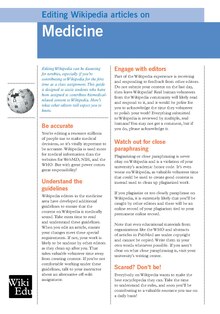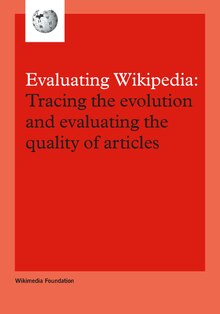Wikipedia:ABIM January 2016

This is the course page for a four-week online Wikipedia lecture series for staff and friends of the American Board of Internal Medicine.
- Wednesday, January 13, 2016 (12-1pm)
- Wednesday, January 20, 2016 (2-3pm)
- Wednesday, January, 27, 2016 (2-3pm)
- Wednesday, February 3, 2016 (2-3pm)
Remember, classes occur ONLINE every Wednesday at 2pm EST and will last 1 hour.
This training is a project from Consumer Reports. Consumer Reports is a United States nonprofit organization which seeks to share information with consumers so that they can make informed purchase decisions. Friends of Consumer Reports may include anyone who wishes to share information about consumer choices. Should you have any questions or concerns, feel free to either contact Lane (user:bluerasberry) at lrasberry![]() consumer.com
consumer.com
This series is complete. Thanks to ABIM friends who participated! password = ABIM
Class overview
[edit]Week one - Tour of Wikipedia's health information
[edit]- See private video of this talk! Only course participants have the password.
We will look at Wikipedia's coverage of health topics and consider the following questions:
- How many health articles does Wikipedia have?
- Who reads them?
- How detailed is Wikipedia's coverage of health content?
- Who writes this content?
- What is the quality control process?
We will also consider medical coverage as a model for the development of Wikipedia content on any subject.
Week two - Editing Wikipedia
[edit]
- See private video of this talk! Only course participants have the password.
We will talk about editing Wikipedia. This talk will not cover the technical process of editing, but instead, will go through the rules of editing and the editorial flow of submitted text as the Wikimedia community processes. We will discuss the culture of editing Wikipedia.
Here is a preview of the inside story-
- Wikipedia is a summary of what is already published
- When information is added to Wikipedia, that information should be followed with a citation to the published source from which it is derived
- The quality of Wikipedia depends on volunteers' ability to identify the best sources. Then they summarize the information in those sources and cite them.
Week three - Quality control and the Wikimedia community
[edit]
- See private video of this talk! Only course participants have the password.
Every work role which exists in any major publishing house also exists in Wikipedia. We will visit some of the work divisions in Wikipedia, consider their labor processes, and talk about how administration and infrastructure development supports front-end content publishing.
Here are some of the wiki-occupations of Wikipedia contributors:
- Managers of new users
- Wikipedia:Welcoming committee
- Wikipedia:New pages patrol
- WP:Teahouse servers
- Reviews of newly created articles
- help
- Wikipedia:Help desk
- Tutorial writing
- noticeboards, such as reliable sources, neutral point of view, or notability
- content creation
- reporters
- writers
- photographer
- videographer
- media scraper
- outreach
- advertiser
- event coordinator
- presenter
- contest organizer
- email for public relations
- Human resources
- on-wiki human resource recruiter
- Wikipedia:Administrators
- Wikipedia:Bureaucrats
- article reviewer
- Dispute resolution
- mediator
- arbitrator
- executioner (actually called administrator)
- vandalism patrol
- policy
- Guideline writer WP:PUMP
- Discussion marketing perhaps through requests for comment
- Development
- legal issues
- So fix it
- staff
- last resort
- board of trustees
- meta:Stewards
- Jimbo, Wikipedia:Appeals to Jimbo
Week four - Tour of Wikimedia projects broadly
[edit]See private video of this talk! Only course participants have the password.
Wikipedia is an encyclopedia and it contains reference text. Other parts of the Wikimedia network of media projects include Wikimedia Commons, the non-text media file repository, Wikisource the document archive, Wikidata the database, and other projects. We will consider how these projects complement each other.
